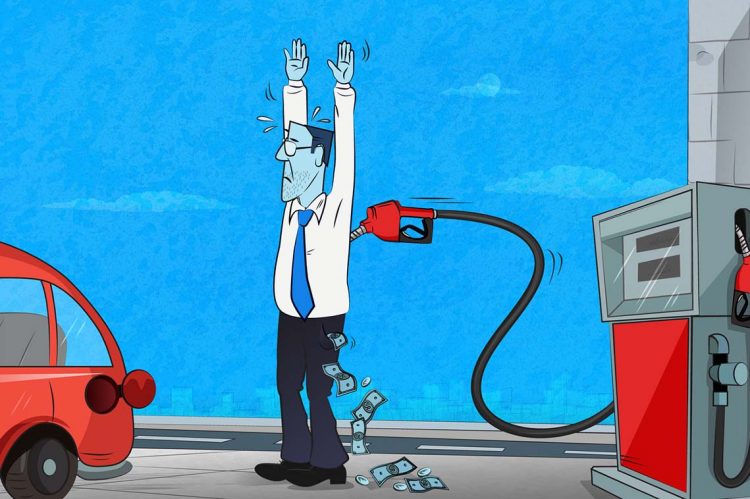As rising inflation continues to send ripples throughout the U.S. economy, consumers nationwide are left shouldering the additional cost of goods and services, which have strained their monthly budgets. This has been particularly evident at the gas pump as the cost of a fill-up has surged in recent months.
The price of gasoline and energy was one of the most significant factors that drove inflation to levels not seen since December 1981. Amid elevated inflation and the effects caused by Russia’s invasion of Ukraine, the national average price for regular gasoline has increased 17% in March, according to a Motley Fool report citing AARP data.
The same report estimated that the increased gas costs could add up to $2,000 to the average household budget this year.
While that may not signal a substantial uptick in annual expenses, real estate experts and professionals tell RISMedia that it could have different effects in the housing market as many consumers face an array of factors weighing on their ability to afford a home.
It may be too early to determine the extent of gas prices’ impact on the real estate market. However, Matthew Gardner, chief economist for Windermere Real Estate, says a possible effect on the market could be where buyers decide to live.
“If it’s going to do anything, it might mean that the radius of the geographic area they were looking in before might have shrunk,” he says. “It wouldn’t surprise me that there are some people out there now who say, ‘I was thinking about moving to one location, but it doesn’t serve me well to get to my place of business.'”
In the past two years of remote work, homeowners and buyers have been allowed to let their lifestyle preferences influence their relocation efforts as many moved farther from their jobs, searching for more affordable homes.
With gas prices elevated, Gardner thinks an increase in commuter costs could catalyze a shift in migration and workforce trends that took hold during the height of the pandemic.
George Ratiu, manager of Economic Research at realtor.com®, shares a similar sentiment.
“I do sense that we will see people take a harder look at housing closer in,” Ratiu says. “That being said, the big question is will people be able to afford to house closer in. Prices continue to rise. Yes, the growth pace is slowing, but they are still rising, especially in urban centers where they were already at higher prices.”
Even before the runup inflation, living closer to urban centers was a hefty expense. According to a recent report by realtor.com®, the average cost of rent surpassed $1,800 a month, marking a 17% annual increase.
According to the most recent S&P CoreLogic/Case-Shiller Indices, national home prices also surged by nearly 20% year-over-year in February. Going a step further, each of the 20 cities analyzed in the index increased by double digits compared to the same period last year.
The surge in gas prices carries a mix of implications that the real estate market is likely to experience, according to Ratiu.
The first and most immediate effect will be felt in the consumer’s monthly finances, especially when commuting to work—a probable outcome as companies reopen and institute hybrid work paradigms.
“It means that financially many folks contemplating the return to the office are looking immediately at an increase in the cost of their commute because if they drive as most people do, they will have higher gas costs,” he says. “Then, in the many cities across the country, they will suddenly have to pay for parking again.”
In essence, Ratiu suggests many workers poised to return to the office are looking at an overall reduced budget due to additional expenses.
“There is a clear impact on housing because, at the end of every month, a lot of families are looking at a loft with less money left over from their paychecks by the time they get to pay all the living and commuting expenses,” he says.
According to Bobby Martins, broker associate with Move Up San Diego, Brokered by EXP Realty, the effects of gas price surges won’t be universally felt among buyers and homeowners.
Martins says the strain on finances will likely be negligible for buyers looking at the higher end of the market compared with buyers looking for entry-level and move-up homes.
“Your buyers that are brand new to the market and are trying to get into their first home are the segment of the population that it affects the most, but sadly that was the segment of the population that we had the largest number of,” says Martins.
With the demand coming from that cohort of buyers and the lack of inventory in the market, Martins thinks that the impacts of higher gas prices on affordability aren’t likely to slow the market overall.
“That’s really the biggest issue with the market as a whole,” he says. “There are so many more buyers out there that want to buy that can’t because there is no inventory.
“Until inventory levels change, nothing will affect the market,” Martins adds.
Jeffery Craw, a Connecticut-based sales associate with William Raveis, has a similar perspective on gas price’s impact on the market.
However, Craw also thinks that gas prices pose a longer-term threat to buyers’ disposable income, which could harm their buying power.
“The energy prices have always been insidious,” he says. “Effectively, they are a tax. People have precious, limited disposable income and when the energy costs go up and soar as they have recently, what happens is their disposable income is constrained, and they can afford less house.”
This is primarily due to the widening affordability gap compounded by price appreciation and the increase in mortgage rates, which climbed from 3% to over 5% in 12 months.
The increase in gas prices is contributing to that challenge, Craw implies.
“There is not one person that I knew going into the pandemic who said this market would appreciate the way it did,” Craw says. “So, I’m not going to tell you that I can time this for when it’s going to happen, but at some point in the long term, the cumulative effect of that erosion of affordability will affect our marketplace.”
 Jordan Grice is RISMedia’s associate online editor. Email him your real estate news to jgrice@rismedia.com.
Jordan Grice is RISMedia’s associate online editor. Email him your real estate news to jgrice@rismedia.com.












